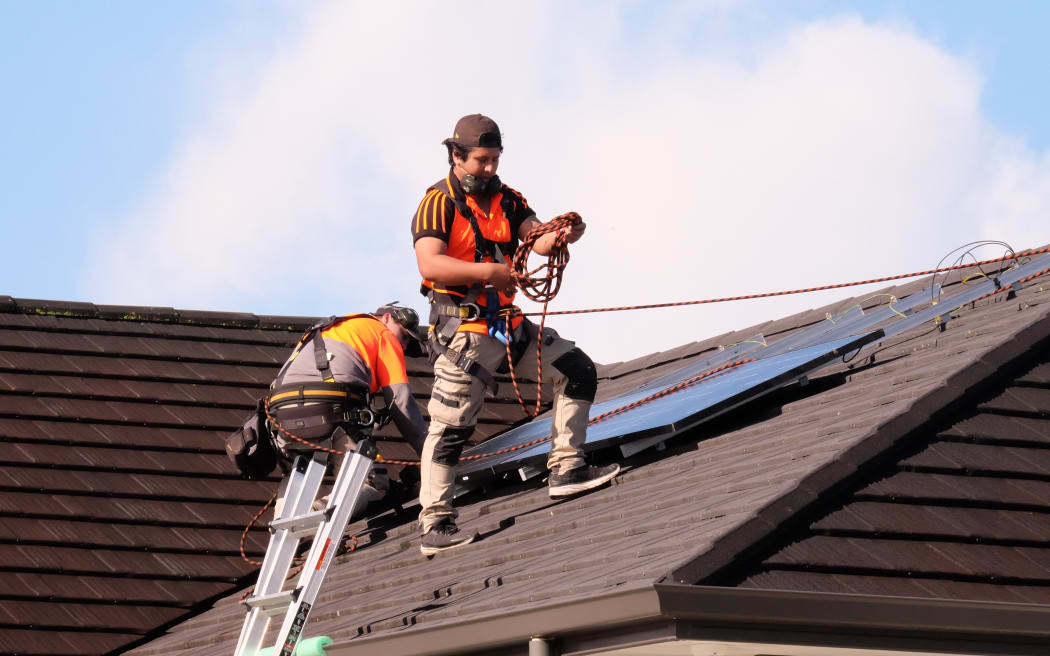Ordinary householders turned off the power last week and saved the country from cuts on the coldest day of the year so far. But there's no recognition or reward for that

Installing SolarZero panels on a home Photo: Supplied/SolarZero
When householders and businesses pulled the country back from the brink of painful power cuts on the coldest day of the year, there was no reward for the sacrifices they made in turning off their heat pumps and lights.
Consumers saved the day and switched off about 260 megawatts of power last Friday when Transpower revealed the country faced a potential electricity shortfall due to the unseasonal cold snap, low wind generation and planned outages of several power stations.
They were the "real unsung heroes", says SolarZero chief executive Matt Ward. In another country they would have been paid for reducing their own power but New Zealand does not have the regulations or mechanisms for incentives, he says.
"That's one of the things we're advocating for; is the market mechanisms and the regulations to be put in place," he says.
Such systems are widely used around the world, including in the UK during the energy crisis caused by the Ukraine war, when a demand response system was set up so that consumers were paid if they turned off their heat pumps, he says.
Ward's SolarZero and its customers helped "keep the lights on" in New Zealand on Friday by providing 30MW of energy into the grid, equivalent to 100,000 hot water systems.
He explains to The Detail how the company's 'virtual power plant' worked on the day, by exporting energy into the national grid from its network of 15,000 residential customers whose homes are powered by solar panels and batteries. They continued to keep their heaters and lights on while feeding their extra power into the grid.
He says it is an example of the new technology that could do more towards a resilient power supply, but it needs the right support from updated market mechanisms.
As the country transitions away from fossil fuels towards 100 percent renewable electricity, Ward says much of the focus has been on building generation. But the biggest challenge for New Zealand is the transmission and distribution of electricity.
"You can't just build your way out of it, you can't have so much resilience in the system because ultimately the consumers will pay for it and they can't afford to pay for it.
"Energy is not like transport," says Ward. "If you think about transport, we all get up in the morning and we all drive between seven and nine, and then four to six. So we have to build an extra lane here or there (to cope).
"But energy's not like that because we can generate the electricity at one in the morning and we can store it in the battery for the peak times so you don't even need to worry about your peak usage."
Ward describes how more active participation of electricity users in the market will turn consumers into 'prosumers'.
"The energy transition is all about involving the consumers," he says.
Electricity industry expert Greg Sise of Energy Link says progress on enabling greater consumer participation and 'demand side flexibility' (DSF) has to be ramped up.
"Things like electric vehicles and industrial electrification are coming at us an increasingly rapid rate and we don't want to be in a situation where we are behind the rate of uptake," he says.
"As we get closer and closer to 100 percent renewable electricity then the need for demand - that is consumers, large consumers, major users, the smelter, Fonterra etc and businesses in general and even down to the residential level - there will be a greater need to participate in the market.
"Demand needs to become more flexible and more responsive."
Sise explains why New Zealand won't reach the 100 percent renewable goal by 2030, if ever; and why we will continue to rely on fossil fuels as a component of our electricity supply.
"There's no doubt about that whatsoever. The only alternative is to turn off our heating and go back to what I remember from the 1970s sitting in candlelight and using our gas cooker during some of the shortages."
You can find out how to listen to and follow The Detail here.
You can also stay up-to-date by liking us on Facebook or following us on Twitter.


